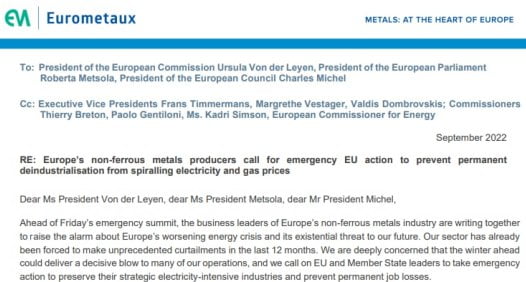“We call on European and national leaders to look at all available options for safeguarding our companies and their future. The crisis requires a complete package of solutions and no option should be left off the table in this unprecedented situation. Our urgent requests (further detailed in the Annex) are that the EU should:
• Take temporary action to address the excessive price of fossil fuel power generators with an aim to reduce the price of power offered to the market while not contributing to further shortages through increased consumption. It is important that any mechanism does not reduce or remove incentives to enter into long-term power purchase agreements for energy-intensive industry. Electricity sold over long-term power purchase agreements must be exempted from revenue cap measures.
• Improve the temporary state aid framework by raising the EUR 50 million threshold for relief Member States can provide to struggling companies adding support for companies temporarily reducing or curtailing production (i.e. for short-term lay-off-costs) and making other crucial technical fixes.
• Actively promote and incentivize the use of renewable power purchase agreements through immediate regulatory action to improve conditions for industrial consumers and a massively accelerated roll-out of renewables generation.
• Minimise the impact of extra carbon costs from the Emissions Trading System through: o Issuing EU guidance to Member States requesting they provide the full allowed compensation of indirect carbon costs (limiting the indirect costs to 1.5% of gross value added) o Using the Market Stability Reserve to address excessive carbon prices which are adding extra pressure onto the electricity price.
• Provide further support to companies through capping taxes and surcharges on electricity and gas creating an emergency EU relief fund for energy-intensive industries.
• Implement schemes supporting short-term interruptibility and demand response flexibility and critically provide support for longer-term care and maintenance curtailments to increase the chance of survival of impacted operations.
More widely it’s important that the European Commission avoids extra regulatory costs on suffering industries in this critical period diversifies sources of gas supply and evaluates options for temporary solidarity measures to rebalance the windfall profits in other specific sectors during this crisis. The upcoming discussions on the electricity market and long-term energy supply are important to the European non-ferrous metals industry and we intend to play an active role.
We appeal for you to take swift and comprehensive action to address today’s crisis situation in Friday’s emergency summit and beyond. We would be pleased to discuss our concerns and recommendations further in a meeting with you.”
The letter also contains two annexes. The first contains a full list of short-term and medium-term measures addressing high energy prices. The second which is truly heart-breaking for me contains an updated list of closures and curtailments in the Non-Ferrous Metals Sector since September 2021. This part reads:
“The ongoing energy crisis continues to have a devastating effect on our sector. The non-ferrous metals industry (including aluminium copper nickel zinc and silicon amongst others) is characterised by extremely high levels of electro-intensity amounting to 40% of our overall production costs under normal power price conditions.
The recent surge in electricity prices has forced all EU’s zinc smelters as well as over half of its aluminium smelters to curtail or even completely idle their production. Since October 2021 the EU has lost nearly half of its primary aluminium capacity (around 1.000.000 tonnes). In the meantime massive capacity additions are taking place outside Europe with a far higher carbon footprint more than replacing curtailed aluminium production in the EU. Zinc and Silicon output have also been reduced since last fall. Due to curtailed output in Europe zinc stocks are extremely low with virtually no stock left in the EU. To compensate for this shortage Zinc is now imported from China. Chinese production is 2 5 times more carbon intensive than European zinc production; 2 8 more in the case of aluminium and 3 8 more for silicon.”

